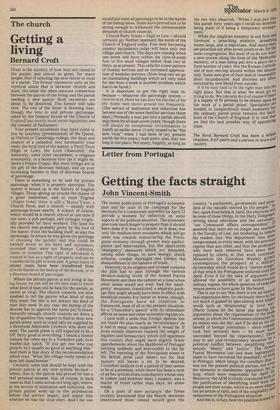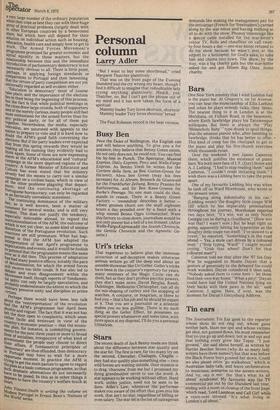Letter from Portugal
Getting the facts straight
John Vincent-Smith
The recent publication of Portugal's economic plan and the start of the campaign for the elections for a constituent assembly on April 12 provide a moment for reflection on some aspects of the political situation. The economic plan took much 'longer to prepare than it should have done if it was to contain, as it does, not only the medium-term measures which will go some way towards restructuring the Portuguese economy through greater state participation and intervention, but the short-term 'emergency' measures which are intended, among other things, to save energy, check inflation, combat shortages and correct the disequilibrium in the balance of trade.
However, in its original and revised versions the plaif had to pass through the various decision-making levels of the Armed Forces Movement and then the cabinet at a time when other issues would not wait: had the 'emergency' measures constituted a separate package they might already have been in effect with beneficial results. For better or worse, though, the Portuguese have no tradition or framework, least of all in the present situation, for a 'Chancellor's speech' with its immediate effects on taxes and other economic regulators.
I note with a smile that foreign opinion has not found the plan nearly as 'revolutionary' as it had in many cases supposed it would be. If more outside observers realised the weight of legalism and bureaucracy which still oppresses this country they might have slightly fewer apprehensions about the likelihood of Portugal lurching suddenly and irrevocably to the far left. The reporting of the Portuguese scene in the British press (and others too for that matter) still leaves a lot to be desired. Consistent analysis over a period of time seems to be at a premium, while there has been a rash of ad hoc articles from contributors whose stay in Lisbon (and nowhere else), I suspect, was a matter of hours rather than days, let alone weeks.
On a point of mere accuracy, the Times recently announced that the March elections (mentioned three times) would give the
country "a parliament, government and presi' dent of the republic elected by the people." ill fact, apart from being in April, the elections vi be none of these things. In the Daily TelegraPIL writing about education and the universit);,' "our Communist affairs correspondent" (.) assertea that there are no longer any teachers in the Faculty of Law, not bothering to infonn his readers that this department was rn°re compromised, in every sense, with the previous regime than any other, and that the professors who have been removed have since been replaced by others, so that work continue,S; Meanwhile the Guardian Weekly griallY contemplated the prospect of a militaq dictatorship which would be a "mirror-image, of that which the Portuguese endured until las; April. Even if for the sake of argument allowed the possibility of an authoritariin military regime, the whole question of ends 90d means seems to have gone by the board. of This is not to say that there is not an issue t real importance here, for obviously there is; bud not much is gained by speculating with loade, words such as 'dictatorship' or 'civil War (Mario Soares let the latter slip during tbde arguments about the organisation of the tra„ unions, in which the Communists ultimatelY 'ye no means won the day, and if he did so for t/ilv benefit of foreign journalists — since nobn„je took him seriously here — he must bavre succeeded beyond his expectations.) T,h,e, may in any post-revolutionary situation bee. potential conflict between, simplifying en°d mously, 'liberty' and 'justice'. The Arrnehr Forces Movement can and does legitimatetii claim to have recreated the possibility of b° it in Portugal, which brings the corollary that n was not the present political parties, not eve 0 the elements in clandestine opposition f0r15. long, which were responsible for April of Moreover, the AFM is totally convinced both,..e the justification of identifying itself with tPri people and their needs, which is no mere sing,ad but an article of faith, and of the originalitY uniqueness of the Portuguese situation.
And this is, in fact, how the position is seen bY a very large number of the ordinary population While they cope as best they can with their huge array of practical problems (largely dealt with in other European countries by a benevolent state, but which here still depend for their solution on individual action such as housing, education, health care and simply how to get to work. The Armed Forces Movement's Programme promised far greater economic and social equality in these matters, but the relationship between this and the immediate introduction of parliamentary democracy is not necessarily obvious to all. There is little point, Perhaps, in applying foreign standards or comparisons to Portugal and then lamenting that the virtues of party competition are not yet universally regarded as self-evident either. 'Education in democracy' must of course take place, and the importance of the election lies in their being the beginning of this process; but the fact is that while political meetings in the cities draw large crowds, both of supporters and of the merely curious, many people still feel more enthusiasm for the armed forces than for anY political party, or for all of them put together. Nevertheless, the media, especially television, are saturated with appeals to the nation to prepare to vote and it is hard now to doubt the AFM's good faith concerning the elections. But if the party leaders ever expected that from this spring onwards they would be
king all the running they evidently had to "1,1nk again. Some of them are now expressing alarm at the AFM's educational and 'cultural' campaign in the more deprived regions of the Country. A former Minister of Education and Culture has even stated that his ministry already had the means to carry out a similar campaign on a civilian basis, which in view of all the other problems plaguing that departrsient, and the continuing shortage of Portuguese bureaucracy, can only be regarded as an heroically unrealistic statement. , The continuing dominance of the military nas, as is well known, been a matter of comment for several weeks, and is still yery evident. This does not justify the tendency, !sPecially noticeable abroad, to regard the institutionalisation of the AFM, the outcome of Which is not yet clear, as some kind of sinister distortion of the Portuguese revolution. Such reactions are still premature. What has happened is that the AFM has adapted the interpretation of last April's programme to. e, xPectations and events, and it would be foolish t_o pretend that the programme means the same 1_10W as it did then. This process of adaptation of had many positive effects, notably the pace t decolonisation, for which the armed forces Still receive too little credit. It has also led to debate and even disagreement within the ,'vlOvement itself, though reports of 'fundamental splits' can only be largely speculative, and Probably underestimate the extent to which the llitarY 'receive unity and discipline as prime ,
virtues.
_, Perhaps there would have been less talk about the 'reinterpretation' of the revolution had the AFM's programme last April been left and vaguer. The fact that it was not has ef t the door open to complaints, which seem rather facile and irrelevant in view of the count ry's economic position — that the economic Plan, for instance, is committing govern'rents for the next three years or more to broad ,ues of socialism, irrespective of what kind of 6,13vernment the people may choose to direct ,Lneir affairs. If fundamental principles of .democracy are thus offended, then democracy in Portugal may have to wait for a more `-',13Portune moment. In practice the AFM is ;Zing to get the main parties to agree to regard the plan as a basic common programme, so that dramatic alternatives do not necessarily have to h °,,v posed. In this as in other things it rIPeaPrtears to have the country's welfare much at John vi ncent-Smith is writing the volume on 'ern Portugal in Ernest Benn's 'Nations of the World' series.











































 Previous page
Previous page